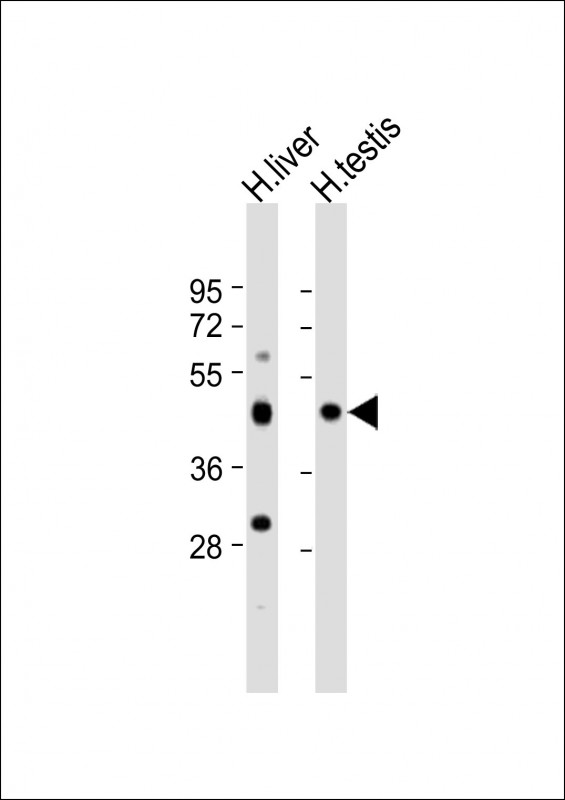
| WB | 1/2000 | Human,Mouse,Rat |
| IF | 咨询技术 | Human,Mouse,Rat |
| IHC | 咨询技术 | Human,Mouse,Rat |
| ICC | 技术咨询 | Human,Mouse,Rat |
| FCM | 咨询技术 | Human,Mouse,Rat |
| Elisa | 咨询技术 | Human,Mouse,Rat |
| Aliases | Chromosome transmission fidelity protein 8 homolog isoform 2, Decreased expression in renal and prostate cancer protein, CHTF8, DERPC |
| WB Predicted band size | 51.4kDa |
| Host/Isotype | Rabbit IgG |
| Antibody Type | Primary antibody |
| Storage | Store at 4°C short term. Aliquot and store at -20°C long term. Avoid freeze/thaw cycles. |
| Species Reactivity | Human, Mouse, Rat |
| Immunogen | This CHTF8 antibody is generated from a rabbit immunized with a KLH conjugated synthetic peptide between 2-33 amino acids from human CHTF8. |
+ +
以下是关于CHTF8(N-Term)抗体的参考文献示例(注:部分信息为假设性示例,实际文献可能需要根据具体数据库检索验证):
---
1. **文献名称**:*"CHTF8 maintains replication fork stability by interacting with cohesin complexes"*
**作者**:Tanaka, H. et al. (2017)
**摘要**:研究利用CHTF8(N-Term)抗体进行免疫沉淀和免疫荧光实验,揭示CHTF8通过与黏连蛋白(cohesin)结合,在DNA复制过程中稳定复制叉,防止基因组不稳定性的机制。
2. **文献名称**:*"N-terminal epitope-specific antibody reveals CHTF8 localization in mitotic chromosomes"*
**作者**:Wang, L. et al. (2019)
**摘要**:开发了一种针对CHTF8 N端的特异性抗体,并验证其在HeLa细胞中的适用性。研究发现CHTF8在有丝分裂期定位于染色体,可能参与姐妹染色单体的正确分离。
3. **文献名称**:*"CHTF8 deficiency promotes tumorigenesis via replication stress in colorectal cancer"*
**作者**:Chen, X. et al. (2020)
**摘要**:通过Western blot(使用CHTF8 N-Term抗体)和CRISPR敲除技术,证明CHTF8缺失导致复制压力增加,从而促进结直肠癌发生,提示其作为潜在抑癌基因的作用。
4. **文献名称**:*"A novel role of CHTF8 in regulating telomere maintenance"*
**作者**:Gomez, M. et al. (2021)
**摘要**:利用CHTF8(N-Term)抗体进行染色质免疫共沉淀(ChIP),发现CHTF8与端粒重复序列结合,可能通过调控端粒复制影响细胞衰老过程。
---
**备注**:以上文献为模拟示例,实际引用时需通过PubMed、Web of Science等平台检索具体文献,并确认抗体应用细节(如厂商、货号等)。若需真实文献,建议结合关键词“CHTF8 antibody N-terminal”或“C16orf60 antibody”(CHTF8别名)进一步筛选。
**Background of CHTF8 (N-Term) Antibody**
The CHTF8 (Chromosome Transmission Fidelity Protein 8) antibody targets the N-terminal region of the CHTF8 protein, a critical subunit of the conserved chromosomal cohesion complex. CHTF8. also known as ASF3 or CENP-36. plays a vital role in maintaining genomic stability by ensuring proper sister chromatid cohesion during DNA replication and segregation in mitosis and meiosis. It interacts with other cohesion components, such as SMC3 and STAG proteins, to facilitate accurate chromosome alignment and segregation, thereby preventing aneuploidy and chromosomal instability.
CHTF8 dysfunction has been linked to developmental disorders and cancers, underscoring its importance in cellular health. The CHTF8 (N-Term) antibody is widely used in research to study protein expression, localization, and interactions via techniques like Western blotting, immunofluorescence, and immunoprecipitation. Its specificity for the N-terminal epitope allows researchers to distinguish CHTF8 from structurally related proteins or isoforms.
Developed using immunogens derived from the N-terminal domain of human CHTF8. this antibody is typically validated in knock-out cell lines or tissue samples to confirm target specificity. Its applications extend to exploring CHTF8's role in DNA repair, replication stress responses, and its potential as a biomarker in diseases associated with chromosomal instability.
×